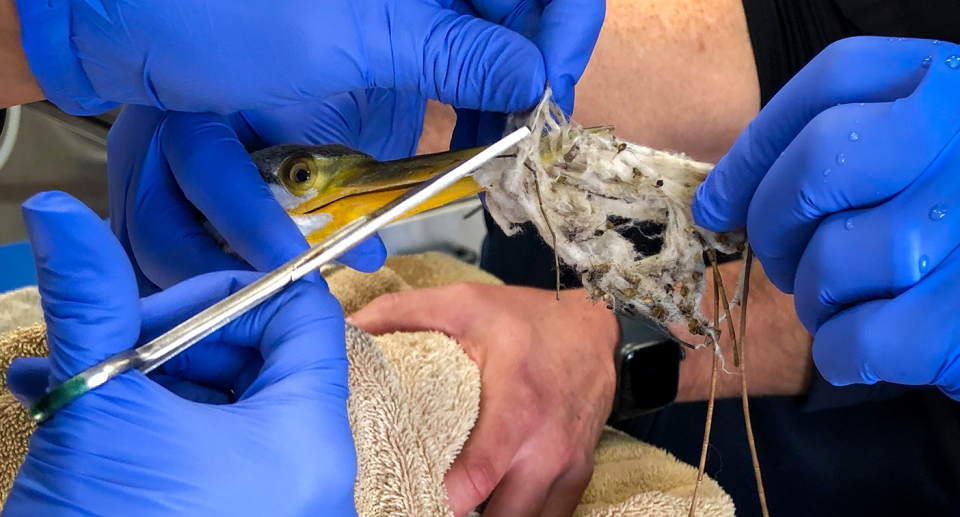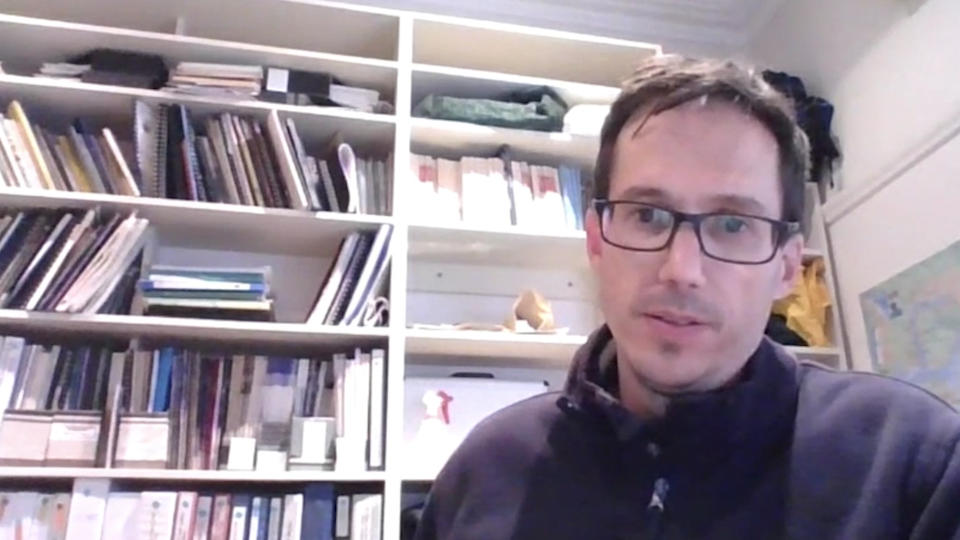'Like velcro': Careless act leaves starving bird unable to eat for DAYS
A small piece of discarded rubbish has almost cost one of Australia’s native birds its life after it was left unable to open its beak for more than a week.
Rescuers from Zoos Victoria were called to assist after a waterbird which was spotted on a lake north of Melbourne became entangled in fabric.
Zoos Victoria’s Marine Response Unit (MRU) Coordinator Mark Keenan told Yahoo News Australia the Australasian darter, rescued in Roxburgh Park, is one of many recent cases of wildlife entanglements.

“We've caught a couple of darters recently, we caught one that had a baby’s sock wrapped around its beak,” he said.
“This fabric [on the other bird] looked like this sort of fabric that makes up nappies or something like that it.
“It had been on the bird for some time so it had broken down, it was sort of very dishevelled and hard to say exactly what it originally was.”
Seven attempts to catch starving bird
The MRU tried seven times over 11 days to capture the struggling creature.
Rescuers had been fearing for the bird’s welfare as it had been unable to feed with its mouth trapped shut by the entanglement.
Notoriously difficult to catch, Mr Keenan describes the species as a “triple threat”.
“They’re super wary of humans, they fly really well as most birds do, and they swim incredibly, so they’re the best underwater swimmer of any birds,” he said.
“We tried to catch it with a net gun... and failed.
“And then we put a kayak on the lake to try and catch it.”
After all of these attempts failed, the team followed the wary bird to a rock that it had been favouring and captured it with a snare.
Once in care, rescuers had to ensure their eyes were shielded from the darter’s beak, as the species has a notoriously sharp beak, and when threatened they have been known to lunge for the face.

A vet and nurse at Melbourne Zoo spent five tense minutes painstakingly removing the fabric from the bird’s beak.
Australasian darters have a serrated beak which prevents fish from escaping their grip, however this feat of evolution unfortunately grabs onto fabric like “velcro”, making it impossible for the bird to free itself without assistance.
With the darter free of fibres, Mr Keenan was able to return to the darter to the lake and witness the “incredible” moment it flew free again.
Behavioural change needed to stop spate of entanglements
This darter is just the latest wildlife victim to run foul of human waste, as stories continue to reveal the effect our throwaway society is having on wildlife around the world.
Images from the UK highlighted the issue of discarded PPE, with a seagull rescued by the RSPCA after it became shackled by the straps of a disposable mask, while closer to home platypus have been strangled by hair ties, and birds snared in fishing line.

Mr Keenan says in a perfect world, his job wouldn’t have to exist, but his team are continuing to take on an increasing amount of seabird cases amid a recent spate of entanglements.
“I'd love to do myself out of a job because that would mean we'd seen enough behavioural change in the community,” he said.
“It's always a concern, sometimes when we return these birds to these environments... and realise that there's so much debris out there.
“We returned one bird back and it was literally entangled two weeks later.
“The first time it was entangled in some sort of braided material, and the second time it had a rubber band cord around its beak and the back of its neck.
“That's the frustrating thing, you feel like you're fighting this uphill battle, but fight on we do.”
Victorians who observe injured marine life can call the Melbourne Zoo MRU on 1300 245 678 for assistance.
The author, Michael Dahlstrom, is a native bird rescuer in NSW.
Do you have a story tip? Email: newsroomau@yahoonews.com.
You can also follow us on Facebook, Instagram and Twitter and download the Yahoo News app from the App Store or Google Play.




